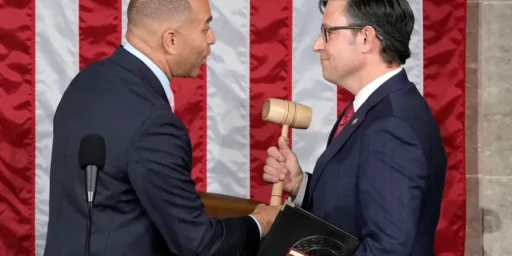A Consensus Speaker of the House!
More centrist fantasies.

Longtime think-tanker and long-ago Republican Senate staffer Alton Frye suggests “Democrats should nominate a Republican successor to Pelosi.” It’s sheer political fantasy fitting for The West Wing.
Rep. Nancy Pelosi (D-Calif.) will no longer be Speaker of the House of Representatives — but she could nominate the next Speaker. In doing so, she could point the way toward the political accommodations so badly needed in a polarized America.
While it has never been done before, the Constitution provides an opportunity to choose a Speaker who is not a member of the House. Seizing that option, a magnanimous Pelosi could persuade her colleagues to propose a distinguished Republican for the role.
We’re approaching the 250th anniversary of the Constitution, so what better time to trot out a loophole never before exploited? I mean, we’re definitely polarized.
Obviously, she would not do so without the support of the Democratic caucus and her successor as party leader, presumably Rep. Hakeem Jeffries (D-N.Y.).
For Jeffries and the caucus, the proposal would present a clear choice between working with an independent Republican Speaker open to bipartisan cooperation and facing protracted friction with an intensely partisan leader, presumably Rep. Kevin McCarthy (R-Calif.), captive to the most extreme faction within the Republican caucus.
Furthermore, both in the election of a Speaker and in subsequent legislative votes, a Democratic offer to support a nationally respected Republican as Speaker would provide a rallying point for moderate GOP House members to form coalitions. Establishing that pattern would both increase the possibility of a convergent cross-party majority on particular issues and, crucially, strengthen the leverage of more moderate Republicans in dealing with their own leader.
That would be awesome, like the time President Bartlett put up Scalia-type and a Ginsburg-type Supreme Court nominees at the same time and everyone just rallied around the move, rather than approving one and then screwing him over. That would definitely work in real life.
I’m sure there are tons of Democrats eager to cast their first vote for a Republican Speaker and enough moderate Republicans willing to risk being primaried to make this work.
The nominee would need to be a person who has earned the respect of both parties and demonstrated commitment to finding common ground among partisans, whenever possible.
It would be helpful, yes.
Such people exist. John Kasich, former governor of Ohio and erstwhile chairman of the House Budget Committee, and Paul Ryan, a former House Speaker and vice presidential candidate, would stand high on the list. (Rep. Liz Cheney (R-Wyo.) would certainly meet the standard, but the intense hostility toward her among many Republicans would make her nomination controversial rather than unifying.)
Kasich, for whom I cast my last vote in a Republican primary, is both a fairly conservative politician and a decent fellow with a long history of compromising to build consensus. Ryan, while able to ape moderation and likability, is arguably the least effective Speaker in decades and has managed to alienate both sides of the aisle. And Frye has already covered Cheney.
A carefully designed initiative of this sort by Democrats could be an act of high statecraft. It must be framed not to exploit the evident divisions among the Republican caucus but rather to open the way for members in both parties who recognize the nation’s urgent need to replace the hyper-partisan strife that has deformed public discourse.
There are, like, 7 of those. The overwhelming majority are in “safe” seats where the only way to lose is to compromise with the other party, thus proving yourself a D/RINO, and thus get primaried.
It would have to recognize that such a Speakership would carry a unique burden of balancing the divergent claims and interests that flow through the House. It would certainly not mean easy sailing for a Democratic agenda.
Let’s assume this fantasy was workable. The Republicans have just experienced an extremely disappointing midterm cycle, vastly underperforming both historical norms and the expectations created by a President who, while remarkably effective at passing major legislation, is very unpopular in terms of his approval ratings. They managed to not retake the Senate, even though it was theirs for the taking, and barely took control of the House. It’s just about inconceivable to me that they’re in any mood to consider “divergent claims and interests,” much less pass any part of “a Democratic agenda.”
The implications of such an arrangement would be manifold. The number of Republicans searching for a constructive posture in the wake of the party’s midterm electoral disappointments remains to be determined. If enough of them are prepared to join such an experiment, there would undoubtedly still be stressful episodes, as the Speaker faced severe frictions between the parties. The Speaker would have to defer to party leaders in setting committee assignments, including chairmanships.
So, here’s the thing: the Speaker is, by definition, the leader of the majority party coalition. If s/he’s not that, they have no power. If they have to defer to some shadow leadership group in setting committee assignments—their main source of power!—they’re Speaker in name only.
Lacking a vote of his own, the Speaker’s principal powers would lie in setting the agenda for floor action on specific legislation. Artfully played, the role could win important influence on the internal priorities of both parties, encouraging proposals that promise reasonable compromise on workable propositions and discouraging ideological showboating. There would remain ample possibilities for the two parties to stake out distinctive positions for future campaigns.
I like the sound of that. I really do. But it makes no sense politically.
First, it assumes that Congressional Republicans have a governing agenda. It has been quite some time since that was obviously true.
Second, even if they did and were willing to give Democrats some of what they want (for reasons I don’t understand, given that the rules of the House allow tiny majorities near-dictatorial control) the deal would have to include a tacit understanding with the Senate and White House that the legislation would be passed. I don’t know how that would even work in practice.
Third, while the practical outcome of accomplishing this would be good for the country, including Republican constituents—passing legislation that enjoys strong, bipartisan support—the political outcome of this would be to virtually ensure Joe Biden’s re-election, since he, not the compromising Republicans, would get the lion’s share of the credit.
The eminent scholar Karl Deutsch taught that “prestige is to power as credit is to cash.” A Speaker selected by a bipartisan coalition would hold a unique historic position and would enjoy unique historic prestige.
That doesn’t seem likely, to be honest. Especially not if they have to defer to others on committee assignments and the like. They’d be seen as a figurehead.
Certainly, in competitive congressional districts, earning his endorsement could be a significant advantage for candidates in future elections. On that basis, his prestige should encourage members of both parties to seek to balance their partisan priorities against the value of earning the Speaker’s favor.
That’s . . . just not how American politics works.
A non-member Speaker working to steer convergence toward the political center could help narrow and isolate the fringe elements in both parties. That could be especially relevant in Republican efforts to move their party beyond the extremes that former President Trump promoted and profited from. A dynamic of this nature would be healthy for Democrats no less than for Republicans.
Wise leaders, including President Biden, understand that the republic cannot thrive if either of its great parties abandons honest competition in favor of bold-faced lies and anti-democratic objectives. Moving to a nonmember Republican Speaker could help revive that party’s worthier traditions.
I would truly like that outcome. I think Biden would happily go along with it, as it would give him his only realistic shot at governing by other than executive order the rest of his term. But the number of districts in which incumbent Republican Representatives would benefit from this are vanishingly small.
Understandably, McCarthy would find denial of the Speakership excruciating. Yet, on reflection, he may see that, if chosen Speaker, he would be condemned to indulge the destructive fringe of his caucus in ways that turn success into ashes in his mouth. Better that he exercises the power of a key leader collaborating with another Republican as Speaker than pay the price of continuing subservience to colleagues who see him as a mere tool for ignoble purposes.
At the end of the day, McCarthy is a wise and strong leader willing to put the good of the country . . . . No. I just can’t.
This idea may seem too far “outside the box” for Pelosi and Jeffries to consider. But weighed against the likelihood of feckless, fractious political struggles, looking outside the House for a successor whom Democrats can propose in good faith could prove the culmination of Pelosi’s distinguished public service. There are reports that some Republican members, not keen on McCarthy as their leader, have been thinking of nominating Trump for Speaker. Though that notion has little chance of gaining traction, a maneuver to put forward a genuinely qualified Republican could do so.
This pretty much refutes itself, no? Folks willing to make Trump the Speaker are almost surely not in the mood for a Never-Trump, or even a Never-Again Trump, Speaker.
The central question becomes how many, if any, Republican members are prepared to accept an offer by Democrats to promote a distinguished Republican alternative for Speaker while continuing their support for McCarthy as majority leader.
Start with the number not interested in being re-nominated and work your way down from there.
If the minority caucus unites in the offer, it would require only a handful of Republicans to judge that such a tradeoff is in the nation’s interest and in their own.
I can just see the campaign ads now. “Representative Smith joined with AOC and the anti-American Squad to reject the Republican candidate for Speaker . . . .”
Ideally, with dozens of members in the Main Street Caucus and the Problem Solvers Caucus — many determined not to yield control to the rightwing fringe — there should be a number who would welcome a chance to strike such a balance.
Having pledged in his campaign to work across the aisle, Main Street Caucus leader Rep. Don Bacon (R-Neb.) has stressed that it is time for centrist Republicans to flex their muscles against extremist forces in the party. Rep. Brian Fitzpatrick (R-Pa.) of the Problem Solvers Caucus has emphasized that his “community has spoken with an overwhelming voice in support of unity, collaboration, moderation and bipartisanship.”
Speaker Pelosi shares with both Kasich and Ryan devotion to the House as an institution. She and Jeffries may think of others who hold that faith. In the benighted state of American politics, that value argues strongly for nominating a Speaker able to work with constructive members on both sides of the aisle. Nancy Pelosi and her Democratic successor are the only ones who can make that a serious proposition.
Look, I really enjoyed The West Wing. I find the fantasy of our political leaders being highly intelligent, principled, folks working to get things done for the good of the American people immensely appealing. And, despite the incentives, I think there are a fair number of them in both parties.
At the same time, the House of Representatives is now and has always, by design, been the most fractious of our national political institutions. It represents the smallest level of the electorate—the District—and is the most frequently put in front of that electorate for judgment. There simply is no “long game” when you’re up every 2 years, much less when your District is drawn to maximize partisan advantage.
Those of us over a certain age remember a time when cross-party wheeling and dealing was much more normal. Figures like former Speaker Tip O’Neil were revered for that ability. But that was possible because our two parties were far less geographically and ideologically sorted. Liberal Republicans, such as Frye’s former boss Senator Edward Brooke (Mass.)* are all but extinct, as are conservative Democrats. Compromise is simply next to impossible under current conditions.
____________
*Who, it must be noted, was defeated for re-election to a third term by the late Paul Tsongas 42 years ago now.






There’s only one choice: Pelosi must immediately nominate Zombie Ronald Reagan!
It’s amazing that people not only get paid for this kind of drivel, but that they are somehow considered wise in the ways of politics…
Herding cats would be a picnic in comparison to this idiocy. What sane individual would even take the job? None. That’s why we are stuck with McCarthy.
Is there a footnote somewhere that details that this plan was created out of a dorm room discussion at 3AM over copious amounts of alcohol?
It would be nice if a congress would do this, but we don’t have that type of congress.
Wouldn’t it be a lot easier for the moderate Republicans in the House (all those desperate for a rallying point to form coalitions, of course) to nominate a non-member ex-Republican as Speaker? Oh, I forgot. Only Democrats have any agency to fix all the damage to being done to American institutions by a Republican caucus that’s gone off the rails.
I suppose speculating on the future is fun, but we still don’t know is McCarthy can be elected.
I read somewhere there was a 19th century congress that went for several months without a speaker, so I suppose that’s possible.
What about Elise Stefanik? She seems ambitious and unscrupulous enough to want the job without having any problems with the Freedom Caucus wish list.
Given this, there really doesn’t need to be a “Second”.
It amazes me that fantasies like this persist, and yet they do.
If we want a system that incentivizes governance, we need to start the long, hard, slow work of getting there instead of constantly hoping some miracle that defies all the incentives of the system will produce a truly fantastical outcome.
(This is just another version of a Magical Moderate Third Party that will appeal to “independents” or the idea that a fusion ticket of a D and R would win the presidency, etc.).
The incentives that drive the system are the core issue, and our entire structure does not incentivize governance as the main goal.
Now that the Republicans control the House, it is imperative that they extend a hand of bipartisanship to the Democrats, and nominate former President Barack Obama as Speaker of the House.
The least fantastical idea would be for Kevin to make a dela with the Democrats for some reluctant support he may not get from the unhinged wing of the Benito Party.
This might have worked in the past if the wingnuts were a smaller proportion and were ascending rather than dominant, and when many other conditions were very different.
These days it wouldn’t because see above, but also because Kevin cannot be counted on to keep his word, and he’d be gone in two years if he did that, primaried out of political existence forever, even if it meant gifting his seat to the Democrats.
We can see, then, the least fantastical idea is too fantastical for words.
@Kathy:
McCarthy announced his intention to drive Omar, Schiff and Salwell off their committee assignments. Any Democrat who votes for him after that is career suicidal. McCarthy wins with only (R) votes or not at all.
@MarkedMan: We all say that, that GOPs have no governing agenda, but we all also know that’s not really true. The Koch and Uihleins and Mercers and DeVos/Princes and Thiel aren’t putting billions of dollars into screwing up politics in support of nothing. It’s largely negative, but they have a very specific agenda. Mostly they want to gain/retain power. But they want the power to prevent their individual and corporate taxes from being raised and to forestall regulation. And they really, really want to do nothing to restrict oil and coal extraction. They want “drift”, which is to say they can live with the status quo and they don’t want to risk any change. Wanting nothing to be done and they’ll fight to ensure nothing is done. Nothing is a political agenda.
They cannot talk about their real agenda, except in very veiled ways. They think they can’t promote their agenda because democracy means the losers are coming after their money. In fact they can’t talk about it because it’s insane. So they’ve invented a nonsensical glibertarian philosophy and they lie. They lie all the time about everything. They lie so thoroughly half of them half belief their lies. And the marks completely believe them.
@gVOR08: I should have added to @gVOR08: that we’re all assuming the author of this piece, Mr. Frye, whoever the hell he is, is stupid. But the odds are he’s lying. He knows this is nonsense, but his little niche in Wingnut Welfare is to pretend division and dysfunction are somehow the Ds responsibility.
The Speaker has too much power as it is – no party is going to give that up.
It would be better to formally get rid of the so-called Hastert rule and return the chamber to regular order procedures. Even better would be to limit the Speaker’s power but that won’t happen either.
I find it more likely that there are five Republicans from districts that are purple enough they could switch parties and get reelected as an incumbent Democrat. Then vote in a Democrat as Speaker. A Democratic Speaker would have control over what reached the floor, but such a group would still control what passed.
Oddly enough, if I were in such a position, I’d probably say, “I’ll switch if Pelosi is going to be the Speaker. I trust her long history of keeping promises. This Jeffries guy, I’m not so sure about him.”
@Andy:
There is nothing to formally get rid of, it’s only a practice, it has no legal force. The GOP can ignore the Hastert rule whenever they please, they all just lack the guts.
@charon:
It’s a tool the Speaker frequently utilizes at their discretion and has become the norm. My goal would be to take that discretion away from the speaker via a formal rule. If one cares about a representative legislature, then giving the Speaker the ability to block legislation from coming to a vote that would otherwise pass is unrepresentative and undemocratic.
And also, a return to regular order for legislation, which is a huge problem that almost no one talks about.
@Andy:
I’m not sure as I don’t do Congress inside baseball stuff, but I think you left the key word–Republican–out of your opening remark. If so, it’s still a decision the GQP caucus must make.
@Andy:
Basically the Hastert rule is an agreement by the speaker, not to bring legislation to the floor unless the caucus is in agreement, how do you write rule quashing that, short of eliminating the speakers power to stop bringing particular bills to the floor?
@Just nutha ignint cracker: Pelosi played the timing on the budget resolution, the infrastructure bill, and the other major spending bills beautifully. She got everything that Schumer could squeeze out of the Senate passed despite some part of her caucus being mad at her the entire time. She’d never have managed that w/o the near total control of what could get to the floor and when.
The crazies have been talking about insisting on a rule change allowing the Speaker to be challenged in a no-confidence vote at any time. If they’re dumb enough to do that, there’s plenty of mischief for Dems to make.
@Andy:
But only Republicans use this tool. How is it a “norm” if only one side does it?
@Just nutha ignint cracker:
It’s not something that only Republicans do.
@Sleeping Dog:
The House adopts rules like the Senate. Such a rule, or any rule, could be adopted to define, refine, or limit the authority of the Speaker. The Constitution itself does not define specific powers for the Speaker or much of anything else – such things are based on tradition and House rules.
@Michael Cain:
Yes, exactly, Pelosi was quite adept at using the powers of the Speaker to achieve her party’s ends. My view is that the House agenda should not be totally and completely subject to the control of one person, which is why I think the power of Speaker ought to be reduced, even though I also realize the chances of that happening are close to zero in the current environment.
@charon: Yes, only the Rs. IIRC no less an authority than Dennis Hastert said there wasn’t really a Hastert Rule. For Ryan it seemed to be sacred writ when convenient and “more what you’d call guidelines than actual rules” when it wasn’t. Legally it has the same force as Moscow Mitch’s rule about a D president can’t appoint a justice the last year before an election, or two, or maybe four.
I believe there is an implicit or explicit agreement in the GOP caucus that the Hastert rule is mandatory – thus, a Republican speaker is either respects it or, if not, has committed career suicide.
The Democrats take a difference approach, have a different attitude towards legislating, so there is no bothsiderism in effect.
@gVOR08:
Really? That was then I guess, I doubt a GOP speaker could get away with that with this Congress.
@Andy:
Yes, there is a process to write a rule, but propose a rule that doesn’t undermine the speakers ability to manage legislation. Again, there is nothing official about the Hastert rule and it is invoked because the speaker decides to do so.
Description of the Hastert rule from Wikipedia.
It’s simply a custom based on the speakers discretion.
Holy… That’s not the dumbest thing in The Hill today. Congress should end the war in Ukraine by withdrawing from NATO.
@gVOR08:
Yeah, that is Bruce Fein, and it’s scary because he’s not a whacked out Sidney Powell or Jenna Ellis type, he actually has main stream conservative credentials (served as associate deputy attorney general and general counsel of the Federal Communications Commission under Reagan). Apparently, he’s entered Neville Chamberlain territory.
@al Ameda: Yeah. I took a quick look at his background. Apparently his focus at FCC was killing the Fairness Doctrine.
@gVOR08:
Amazing he has no trouble writing with Putin’s hand so far up his rectum.
He does have trouble seeing things like: The US has rallied and led NATO to aid Ukraine’s defense. The US chose to be involved in aiding Ukraine. It was not forced to do so out of treaty obligations, as it would have been had Putin invaded the Baltic states or Poland.
So, sure, let’s ignore all manner of short and long term consequences and leave NATO.
But keep sending aid to Ukraine, and urging and coordinating more aid from Europe.
@al Ameda:
And, seriously, what is it with the right’s obsession with the Nobel Prize?
Benito I understand. Obama got one, therefore he deserves two.
But to get a Peace Prize, one needs to do something to aid the cause of peace. Allowing a bully nation to overrun a peaceful neighbor does not qualify.
How’s this: When the earlier Benito invaded Ethiopia, Mexico did absolutely nothing, not one damned thing, to help the Ethiopians in their defense. Where’s our Nobel Peace Prize for such valiant action?
Of course. How silly of me. it would have had to be shared with all the other countries who also did nothing to stop italy from quickly consummating its objectives, and the rules say only three persons can share a Prize.
My bad.
@Kathy: I hate to say it, but Fein’s position makes sense from their point of view. Realpolitik considerations of containing Russia aside, we’re defending liberal democracy and self determination. Which mean nothing to these people. Fein says nothing about what would happen to Ukraine. Apparently a matter of indifference to him.
I could write a long comment outlining ways in which the constitution should be amended to end Congressional gridlock, restore true representative democracy, and remove the federal courts from partisan influence. It would be as foolish an exercise in ‘let’s pretend’ as Frye’s nonsense.
@al Ameda:
A distinction without a difference.